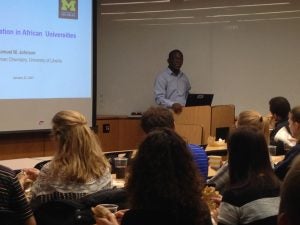A seminar and discussion on”Chemistry Education in Africa” was given by Samuel Mawolo Johnson. Samuel is a visiting scholar of the U-M African Presidential Scholars (UMAPS) program in collaboration with Prof. Brian Coppola, Prof. Bart Bartlett, Dr. Alex Poniatowski, and Samuel Earey on developing chemistry laboratory experiments to take back to his home university at the University of Liberia, which has been gutted and left in poor conditions after the recent civil war.
Due to poor access to chemicals and proper equipment, the Department of Chemistry at the University of Liberia has had enormous difficulty teaching laboratory to their students safely, with students working without proper gloves, goggles, or lab coats. With holes in the ceiling, no electric, and no fume hoods to operate in, conducting general chemistry laboratories the way we typically think of them in the US is near impossible. In his presentation, Samuel discussed a brief history of Liberia, outlined the state of chemical education in West Africa, and presented some of chemistry experiments he has designed that are tuned to his conditions back at home. He talked about possible future, long-term collaboration with the UM chemistry department will shape the future of his home university.
Student commentary:
Samuel Johnson’s talk on January 27, 2017 on Chemical Education in West Africa was an enlightening view on how the universities within several countries in West Africa see education in chemistry. While surrounding countries around Liberia offer relatively new or renovated laboratory spaces and graduate-level degrees, the epidemic of Ebola coupled with the crippling economy post-civil war has left the University of Liberia with looted lab spaces, subpar teaching conditions, and few staffing or funds necessary for PhD-level education in chemistry. The talk was focused on how Samuel has redesigned his introductory chemistry laboratories and discussions with little access to electricity, running water, or chemical supplies and personal protective equipment (PPE). These working conditions for students were eye-opening to graduate students and faculty attending this seminar, who rarely, if ever, have experienced these challenges within their own chemistry careers. Many questions regarding the cost of education, interest in the chemistry major, and the future career paths of chemistry students with new bachelor’s degrees from the University of Liberia were all discussed in detail between participants and the speaker. The talk ended with many participants staying after asking further questions, wondering how they themselves could help or participate in the effort to better Samuel’s situation back at his home university. It left both students, faculty, and the speaker himself with a fresh take on problems within Chemical Education internationally, and with fresh new ideas and possibilities for future directions on improving the working conditions of the chemistry labs at the University of Liberia.


